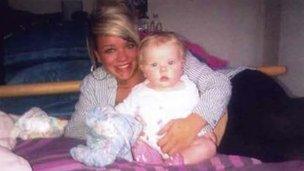Liquitabs alert after children burned
- Published
Five children suffering from chemical burns have been admitted to a Glasgow hospital this year alone
Doctors are warning about the dangers of liquitabs used in washing machines and dishwashers, after treating some children for near fatal injuries.
The Royal Hospital for Sick Children in Glasgow has admitted five children this year, all under two, who had either bitten into or squeezed the tabs.
They suffered chemical burns to their eyes or throats.
When liquid was swallowed, a tube had to be inserted to aid breathing until swelling in the airways was treated.
Dr Lyndsay Fraser, from the hospital's ear nose and throat unit, said: "We have known for some time about the risk of eye injuries from kids squeezing these liquitabs until they burst.
"What we have seen more recently is that children are biting into the tablets, presumably because they think they are sweets as they have the same soft texture and bright colouring.
"The alkaline chemicals in the liquitab cause an immediate chemical burn, causing breathing problems as the airway starts to swell rapidly.

Shannon Hutchison's daughter Orla spent 10 days in hospital
"Getting them to hospital straight away is imperative. In most of the cases seen so far we have had to insert a breathing tube to protect the child's airway from the swelling and help them breathe."
Dr Fraser said that if these children had not reached the hospital on time, their airway "could have closed over completely with potentially fatal consequences".
The medic added: "Once the breathing tube has been inserted, children can be on a ventilator for anything up to two weeks whilst the swelling settles and one child so far has required further surgery to repair the damage caused by the liquitab.
"It really is only good fortune that we haven't seen a death resulting from this type of injury."
Staff at the hospital have been alarmed by the number of children recently admitted as emergency cases.
They have now published a letter in the Archives of Diseases in Childhood to alert medical colleagues and parents to the dangers of liquitabs.
Dr Fraser said: "Most liquitab brands do not come packaged in child proof containers so it is easy to access to them especially if they are left within reach and sight of young children or toddlers.
"Most parents are not aware of the dangers of these common household items, commonly storing them in unlocked cupboards within potential reach of their child.
"It is important parents realise that these liquid capsules are dangerous chemicals and they should be kept locked away so children can't reach them."
Shannon Hutchison backed the hospital's safety campaign after her daughter Orla swallowed the contents of a liquitab at the age of seven months.
She said: "Orla was at my sister's house playing with my two-year-old nephew who managed to get hold of one of these liquitabs.
"He thought it was a sweetie because it was bright and like a jelly so he gave it to Orla who bit into it.
"Immediately we realised there was a problem as she was going in and out of consciousness so phoned an ambulance right away, it was terrifying. I'm just so lucky to still have my little girl."
'Bright sweeties'
Orla was rushed to intensive care and spent 10 days in hospital.
Since the incident, Shannon said she had been much more careful about where all her family are keeping liquitabs.
"To kids they do look like bright sweeties and they are not in a sealed box, kids can get into them so easily and I had no idea what could happen until I saw what happened to Orla," she said.
"When we got to hospital the doctors told me they see this two or three a year. Now I make sure that all the liquitabs are locked away and I tell everyone to do the same.
"The boxes they come in really should be child proof and I hope manufacturers do something about this as I wouldn't want this to happen to any other little girl or boy."